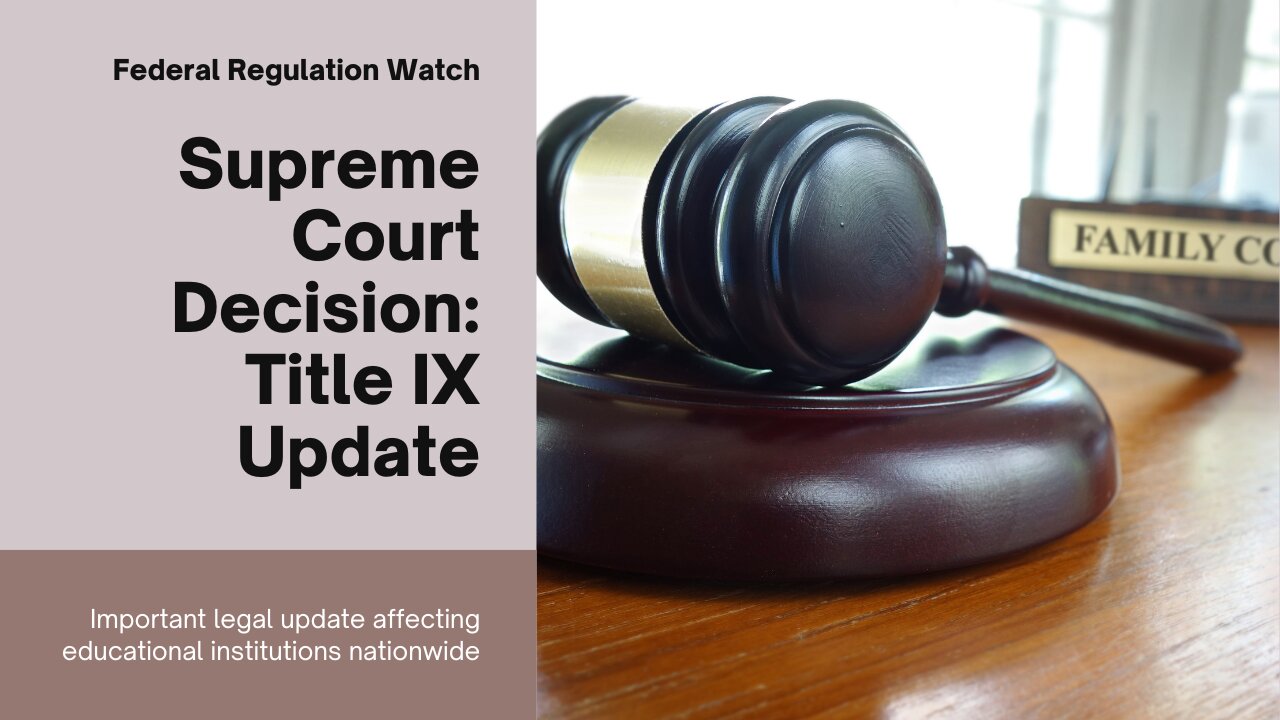Premium Only Content

Title IX trans-friendly rule change enjoined
Title IX trans-friendly rule change enjoined
By Terry A. Hurlbut
Yesterday the Supreme Court – in a rare summertime decision – let stand two separate injunctions against a new Title IX rule. The Department of Education issued this rule in April – to permit transgender students to identity as the gender of their choice in all contexts. This included use of restrooms and locker rooms appropriate to their identified gender, without regard to their biological gender. This new rule has, of course, provoked protests, mainly from female students and their parents. Indeed the Attorneys General of several States sued the Education Department and/or Secretary in two separate courts to block it. Two separate federal judges enjoined enforcement of the entire Final Rule. Two separate Circuit Courts of Appeals denied motions to stay these injunctions. Yesterday the Supreme Court denied two separate emergency applications-for-stay. So for now – in at least seven States – Title IX remains as is.
History of the Title IX rule change
The phrase Title IX is short for “Title IX of the Education Amendments of 1972.” Most people who went to secondary school or college in that year, or shortly thereafter, remember Title IX as “:the law that eliminated men’s wrestling.” Title IX forbids discrimination against women either in sports or trying out for sports at schools that receive federal funds. This Title “eliminated men’s wrestling” because lawyers have construed it to mean that schools must allow numbers of male and female student athletes in proportion to their total enrollments. So if athletic departments have football – an exclusively male sport – it must disallow enough male teams to make those proportions “come out even.” So, goodbye men’s wrestling – unless the school is a boys’ school or foregoes federal funds.
That was bad enough. But in April, the Biden administration implemented two kinds of changes to Title IX. The first declared that male students, not only faculty or staff, faced Kafka-esque one-sided disciplinary process for any word or deed that any self-identified woman regarded as threatening. And according to the second, discrimination applied to gender identity. This required female students (including athletes) to share bathrooms, locker rooms, and changing rooms with self-declared women. These included males, which also could try out for women’s teams if they so declared. Likewise, biological women would have to compete against self-declared women who were biological men. (See the Final Rule here.)
What this meant for Title IX and its original purpose
The first part of the Final Rule, with its one-sided disciplinary procedures against all self-declared males, would have been bad enough in and of itself. If that were the only rule change, Title IX would still be “The Law That Ended Men’s Wrestling.” But CNAV repeats what it said four months ago about the disciplinary changes for men. On one hand, depriving any male of employment or educational opportunity, without due process, violates the spirit of the Constitution. An adult would have a cause of legal action – and a minor would get a poor civics lesson if such lack of due process ever became the norm, in any context.
On the other hand, school – especially elementary and secondary school – is no place for sexual relations. Likely no real problem exists that a return to good old-fashioned chaperonage wouldn’t repair. Perhaps a return to separate institutions for males and females, with provision for classroom exchange (except in athletics and physical education) would be in order.
But the second part of the rule change – the “transgender folly” provision – virtually negates any effort to protect females’ opportunities. Women’s sports were never intended as the refuge for mediocre males. As many have already observed, these rules end Title IX. At least the old Title IX sought to enhance women’s opportunities. These new rules destroy them – and worse, leave women athletes open to violent assault under color of competition. As actually happened in Women’s Boxing at the 2024 Paris Olympics.
The lawsuits
On April 29, the Education Department handed down its Final Rule. On that day, the Attorneys General of four States (Mississippi, Louisiana, Montana and Idaho), plus the Louisiana Education Department, sued the federal Department of Education, its Office for Civil Rights, the Justice Department, and their respective heads. They filed this action in the U.S. District Court for the Western District of Louisiana (Monroe Division). Note that the Missouri v. Biden plantiffs filed their action in the same District Court and division. On April 30, six States (Virginia, Kentucky, Tennessee, Indiana, Ohio, and West Virginia) sued Education Secretary Miguel Cardona. They also sued his Department, and filed in the U.S. District Court for the Eastern District of Kentucky (Covington Division).
Both sets of plaintiffs alleged excession of lawful authority, in violation of the Administrative Procedure Act. In addition the Louisiana plaintiffs said the Final Rule was unconstitutional, under the Spending and Legislative Power Vesting Clauses. They also called the Rule “arbitrary and capricious” and “without observance of procedure required by law.” The Tennessee plaintiffs alleged the same things but phrased them differently.
Both complaints challenge three parts of the Final Rule:
1. Redefining “discrimination on the basis of sex” to include gender identity,
2. Entitling persons of a self-declared gender to enter the spaces reserved for persons of that gender, and
3. Defining “hostile environment harassment” to include any comment about who is, and who is not, a man or woman.
Motions for preliminary injunctions
Each set of plaintiffs moved for a preliminary injunction on the basis of those three challenges. In addition, each set argued that the other provisions of the Final Rule were so “intertwined” with the three challenged provisions, that no court could disentangle them. Accordingly, they called for an injunction against the entire Final Rule.
Each District Court judge granted such an injunction. Judge Terry A. Doughty in Monroe, Louisiana, handed down his injunction on June 13. Judge Danny C. Reeves in Covington, Kentucky, handed down his injunction on June 17. In his order, Judge Reeves began with this statement:
There are two sexes: male and female.
He also put in this footnote:
The defendants made this concession during oral arguments on the plaintiffs’ motion for injunctive relief. The parties have agreed to little else.
Toward the end of June, the federal government appealed each injunction to its respective Circuit: Fifth (Louisiana) and Sixth (Tennessee). On July 1, they asked each Circuit Court to stay the respective injunction before it.
Both appellate panels denied the respective motions before them on July 17. Each panel said the Education Department had forfeited severability by not contemplating how to enforce the rest of the rule without the challenged provisions. In addition, the Fifth Circuit tersely chided the Department for expecting the court to parse the Final Rule for them. Likewise, the Sixth Circuit panel said the Department didn’t identify any harms from enjoining the entire Rule apart from the challenged provisions.
At the Supreme Court
On July 22, two separate emergency applications for stay arrived at the Court. Justice Samuel A. Alito, supervising the Fifth Circuit, and Justice Brett Kavanaugh, supervising the Sixth, received the applications. The Louisiana and Tennessee applications each drew a response and friend-of-the-court briefs.
The Court reviewed both applications at once, and issued a combined opinion. Four Justices (Neil Gorsuch, and Liberals Ketanji Brown Jackson, Elena Kagan, and Sonia Sotomayor) dissented in part. Therefore most media are reporting this as a 5-4 decision. The main opinion is per curiam, which means, unsigned. In their decision, the Court held:
Importantly, all Members of the Court today accept that the plaintiffs were entitled to preliminary injunctive relief as to three provisions of the rule, including the central provision that newly defines sex discrimination to include discrimination on the basis of sexual orientation and gender identity. But the Government argues (and the dissent agrees) that those provisions should be severed and that the other provisions of the new rule should still be permitted to take effect in the interim period while the Government’s appeals of the preliminary injunctions are pending in the Courts of Appeals. The lower courts concluded otherwise because the new definition of sex discrimination is intertwined with and affects many other provisions of the new rule. Those courts therefore concluded, at least at this preliminary stage, that the allegedly unlawful provisions are not readily severable from the remaining provisions. The lower courts also pointed out the difficulty that schools would face in determining how to apply the rule for a temporary period with some provisions in effect and some enjoined.
Furthermore, the Court noted that the Sixth Circuit has already scheduled oral argument for October. (The Fifth Circuit docket has seen no documents since July 19.)
Justice Sotomayor seemed to think the challenged provisions of the Final Rule are severable. In so doing, she seems to lay the burden of proof on the States responding to the stay applications. While Justice Neil Gorsuch agreed with that, Chief Justice Roberts and his fellow Moderates did not. Like the Appeals Courts earlier, the Supreme Court lays the burden on the federal government as appellant and applicant.
Reaction and analysis
The most important reaction to the ruling came from Riley Gaines. Recall that she lost a trophy to a mediocre male competing against her as a woman.
https://x.com/Riley_Gaines_/status/1824575671550742771
The “compelled speech” to which Gaines (and the plaintiffs and lower courts) referred is mainly the mandate to:
• Speak of any “trans” person using their preferred third-person singular personal pronouns, and
• Address such a person by his or her preferred honorifics, as “Mr./Ms.”, “Sir/Madam/Miss”, etc.
Thus far, first (“I/my/mine/me,” “we/our/ours/us”) and second (“you/your/yours”) person personal pronouns don’t matter. In most languages, including English, they all have common gender. (But that’s not true of some Spanish verb endings attached to infinitives! The objective endings -lo and -la always agree with the object of the action in gender.)
In any event, the two cases have appeals in their respective Circuit Courts, and are each going to trial. No doubt one or both cases will come to the Supreme Court, given the issues involved. But the election might render them moot, because Donald Trump has already pledged to “keep men out of women’s sports.”
Link to :
The article:
https://cnav.news/2024/08/17/news/title-ix-trans-friendly-rule-change-enjoined/
New Title IX unofficial rules:
https://www2.ed.gov/about/offices/list/ocr/docs/t9-unofficial-final-rule-2024.pdf
Case filings:
Louisiana case:
District level:
https://www.courtlistener.com/docket/68479494/state-of-louisiana-v-u-s-dept-of-education/
(Complaint)
https://storage.courtlistener.com/recap/gov.uscourts.lawd.205659/gov.uscourts.lawd.205659.1.0.pdf
(Injunction)
https://storage.courtlistener.com/recap/gov.uscourts.lawd.205659/gov.uscourts.lawd.205659.53.0.pdf
Appellate level:
https://www.courtlistener.com/docket/68898037/state-of-louisiana-v-educ/
(Order denying stay)
https://storage.courtlistener.com/recap/gov.uscourts.ca5.219883/gov.uscourts.ca5.219883.73.1.pdf
Tennessee case:
District level:
https://www.courtlistener.com/docket/68487552/state-of-tennessee-v-cardona/
(Complaint)
https://storage.courtlistener.com/recap/gov.uscourts.kyed.104801/gov.uscourts.kyed.104801.1.0_1.pdf
(Injunction)
https://storage.courtlistener.com/recap/gov.uscourts.kyed.104801/gov.uscourts.kyed.104801.100.0_1.pdf
Appellate level:
https://www.courtlistener.com/docket/68887110/tn-v-miguel-cardona/
(Order denying stay)
https://storage.courtlistener.com/recap/gov.uscourts.ca6.151770/gov.uscourts.ca6.151770.41.0.pdf
Supreme Court dockets and opinion:
Louisiana case:
https://www.supremecourt.gov/search.aspx?filename=/docket/docketfiles/html/public/24a78.html
Tennessee case:
https://www.supremecourt.gov/search.aspx?filename=/docket/docketfiles/html/public/24a79.html
Detached opinion:
https://www.supremecourt.gov/opinions/23pdf/24a78_f2ah.pdf
Riley Gaines’ post:
https://x.com/Riley_Gaines_/status/1824575671550742771
Declarations of Truth X feed:
https://x.com/DecTruth
Declarations of Truth Locals Community:
https://declarationsoftruth.locals.com/
Conservative News and Views:
https://cnav.news/
Clixnet Media
https://clixnet.com/
-
 14:55
14:55
Declarations of Truth
8 days agoDemocrats breaking ranks?
1161 -
 2:08:19
2:08:19
Tactical Advisor
14 hours agoThe Vault Room Podcast 006 | Farwell 2024 New Plans for 2025
173K11 -
 34:12
34:12
inspirePlay
1 day ago $5.09 earned🏆 The Grid Championship 2024 – Cass Meyer vs. Kelly Rudney | Epic Battle for Long Drive Glory!
75.9K8 -
 17:50
17:50
BlackDiamondGunsandGear
12 hours ago $1.91 earnedTeach Me How to Build an AR-15
50.7K6 -
 9:11
9:11
Space Ice
1 day agoFatman - Greatest Santa Claus Fighting Hitmen Movie Of Mel Gibson's Career - Best Movie Ever
110K45 -
 42:38
42:38
Brewzle
1 day agoI Spent Too Much Money Bourbon Hunting In Kentucky
74K12 -
 1:15:30
1:15:30
World Nomac
20 hours agoMY FIRST DAY BACK in Manila Philippines 🇵🇭
57K9 -
 13:19
13:19
Dr David Jockers
1 day ago $10.86 earned5 Dangerous Food Ingredients That Drive Inflammation
76.5K17 -
 1:05:13
1:05:13
FamilyFriendlyGaming
1 day ago $15.76 earnedCat Quest III Episode 8
129K3 -
 10:39
10:39
Cooking with Gruel
2 days agoMastering a Succulent London Broil
82.8K5